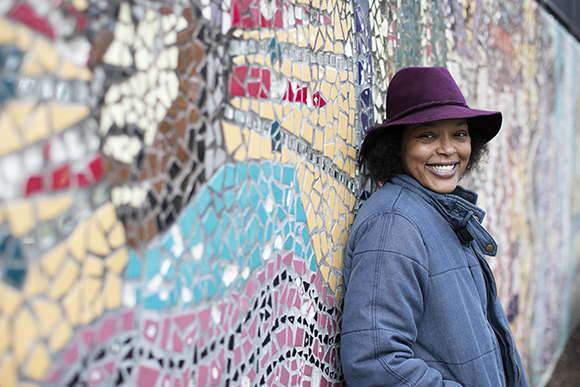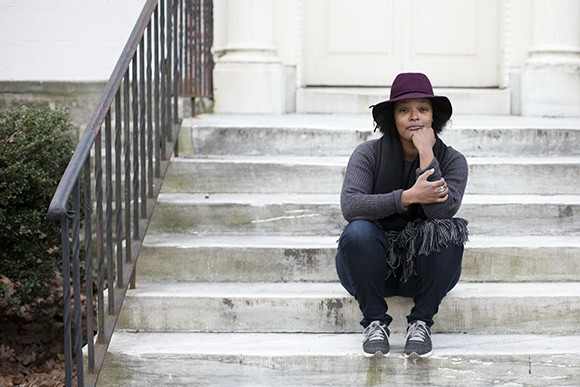Philadelphia Poet Laureate Yolanda Wisher dreams while walking on the ground
Philadelphia might best be known as the City of Brotherly Love, but it could also be called the City of Poets for its dedication to supporting and promoting the literary form. With a citywide Poet Laureate program launched in 2012, Philadelphia is a national leader in promoting the work and value of local poets in enriching schools, neighborhoods, and artistic communities.
Yolanda Wisher is currently the third Poet Laureate for the City of Philadelphia, following in the footsteps of her former Temple University professor, celebrated poet and activist Sonia Sanchez, a major voice in the Black Arts Movement and also Philadelphia’s first Poet Laureate.
Wisher has been writing poetry since she was a little kid but, she says, it wasn’t until she got to graduate school that she started to think of poetry as a form of public art and community activism.
“It’s something I feel deeply about in my own life and my own personal healing,” she says. “It has been the thing that has got me through life. When I started thinking about living in Philadelphia and the different communities I’ve lived in, I started thinking about the most authentic ways I could engage in the community, and it always started with poetry.”
Her experimentation with poetry as a method of activism in grad school became a kind of pedagogical approach as Wisher worked as a high school English teacher for 10 years, then in arts administration as the Director of Education for the City of Philadelphia Mural Arts Program. When she left that job, she became a full-time freelance writer, performer, and educator. Now she teaches, performs, advises, edits, speaks, writes, and organizes, often using poetry as a starting point.
“Sometimes it’s the process, sometimes it’s the product, sometimes it’s the [realm] I invite people into. It is my vehicle for the community work that I do,” she says. “Poetry invites people to examine their lives, even in the smallest details. It invites them to examine the mysteries of life, the complexities and the hypocrisies of it. Poetry embraces the enigmatic in a way that doesn’t make it easy to understand but invites that enjoyment, and sometimes the confusion – the gray area that we exist in in our interactions.”
The Poet Laureate position is a two-year appointment during which time the Poet Laureate engages with the city through events, community service activities, workshops with people of all ages and backgrounds, and speaking engagements, and also acts as a mentor for the city’s Youth Poet Laureate.

“I see a lot of my work as being an ambassador to poetry. Poetry is not dead and it’s still really cool; it hasn’t lost any cool points,” Wisher laughs. “Poetry can be your way of working in the world, especially if you’re interested in spurring change and supporting neighborhood growth and investment in the community. I never heard that growing up – that poetry can be your activism; poetry can be your work.”
She runs a variety of different workshops in schools for different age groups with the primary goal of getting people to embrace their creativity and their unique ways of seeing the world and describing things. She also looks outside of mere words on paper, utilizing a visual and tactile approach to creativity.
“I love just getting our hands dirty with words,” she explains. “Poetry is not just something that happens inside your head and you have to translate that to paper and articulate it with your mouth. I like for people to get physical with language in workshops. I like to work with different sheets and sizes of paper. I will use paint strips to talk about color and how people perceive color [as an allegory of] how we see the world differently from one another. I like to invite people to use what we have around us to make something new. The best artfulness I saw growing up was seeing people making something out nothing – my mom making stew out of odds and ends in the fridge or quilts patched together [from other bits of fabric].”
In a stark contrast to the stereotype of the reclusive poet locked away in his or her room shunning all human contact, Wisher actually sees poetry as a collaborative art. “I can never underestimate the depth of connections that are formed or the power of people working together to create something,” she says.
She has groups of youth write duet and group poems. She also uses story circles as a method to get people to open up and share with each other in order to build their capacity to listen to one another.
“The practice of just documenting your life is a signal or an acceptance that your life has meaning, that you are important, or even if you feel invisible or peripheral in this society it is creating the space for people to write about their own lives, whether they’re sharing it or not. That is a really powerful place for poetry,” she says. “So many people won’t write their story. They won’t have a movie made about their lives or write a best-selling novel or book of poems. But I wish I had the journal of my great grandmother or my aunts. I wish they were encouraged to write their stories. I wish they had been told that their stories would be of interest to and desired by their future family.”

Wisher acknowledges that history is one of her biggest sources of inspiration. She says she has always been drawn to history as a subject, particularly Black history. She even considers the neighborhood in Philadelphia where she lives – Germantown – a source of historical inspiration (in fact, a cooperative coffee house concept she is developing in Germantown is a 2017 Knight Cities Challenge finalist).
“There is a lot of colonial history that runs alongside the history of indentured servants and enslavement history here,” she explains. “Then, in the 1950s, there was white flight and jobs lost here. I’m interested in how that history informs what we see today. I’m always drawn to revisit history and come back with some new lessons or some new perspectives and some renewed empathy in how we lived and how we live now.”
The history of Black people in America is a particular source of fascination and inspiration to her. As Africans were brought to the States and sold into slavery, their history was lost. Even scouring Ancestry.com – a favorite pastime of hers, Wisher confesses – yields few results.
“A lot of that history of African Americans in this country is lost,” she says. “I’m interested in that erasure. To me a lot of this work is about filling those gaps in and creating families you didn’t know were [out there]. Every workshop is about expanding a sense of family in the face of that diaspora.”
At a time when facts are merely suggestions with “alternatives” and history is seemingly rewritten every day, Wisher sees the need for a shared sense of history and collective memory all the more pressing.
“I think it’s important to hold the line with history. We need people who are going to be truth-bearers and storytellers and be confident about the traditions that we walk in and that we come out of,” she states. “I come out of the Black Arts tradition. That’s still a necessary life to live in. That’s the path I’m still walking in. We really just need to check ourselves and our daily interactions with people. There is a lot of highflying rhetoric right now, but sometimes for me it just boils down to the everyday interactions I’m having when I step outside my door. How many times do I have to count examples of ignorance or micro aggressions? To me that everyday journey we’re all on to respect each other as human beings has to lead to a more sympathetic, loving national discourse. So many people are living in theory but we need to live in practice right now. We need to dream while walking on the ground.”

(1) How do you like to collaborate?
Improvisationally and mischievously!
(2) How do you a start a project?
With mind maps and doodles.
(3) How do you talk about your value?
My experience + my knowledge + my passion + my grind + my magic
(4) How do you define success?
The degree to which I feel present and whole and free in any given situation.
(5) How do you fund your work?
Grants, fellowships, commissions, partnerships.

Well-deserved attention to a special gem of Germantown and all of Philadelphia!
[…] Rucker herself may just be such a person for another little boy or girl out there inspired by her powerful stage presence or by her recorded works with such prominent voices as legendary hip hop outfit The Roots. Comparisons to other passionate, politically-minded Black female poets like Nikki Giovanni and Sonia Sanchez come easily; in the case of the latter, the comparison is all the more obvious as Rucker was also once Sanchez’s student. […]